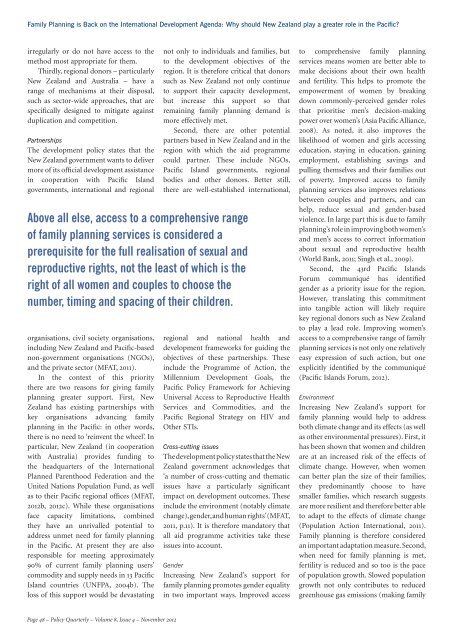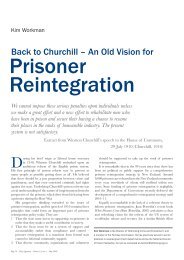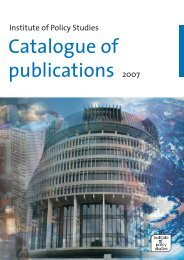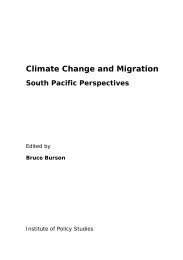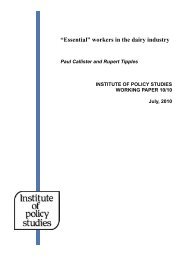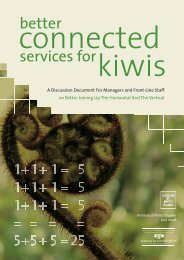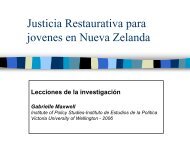PDF File - Institute for Governance and Policy Studies - Victoria ...
PDF File - Institute for Governance and Policy Studies - Victoria ...
PDF File - Institute for Governance and Policy Studies - Victoria ...
You also want an ePaper? Increase the reach of your titles
YUMPU automatically turns print PDFs into web optimized ePapers that Google loves.
Family Planning is Back on the International Development Agenda: Why should New Zeal<strong>and</strong> play a greater role in the Pacific<br />
irregularly or do not have access to the<br />
method most appropriate <strong>for</strong> them.<br />
Thirdly, regional donors – particularly<br />
New Zeal<strong>and</strong> <strong>and</strong> Australia – have a<br />
range of mechanisms at their disposal,<br />
such as sector-wide approaches, that are<br />
specifically designed to mitigate against<br />
duplication <strong>and</strong> competition.<br />
Partnerships<br />
The development policy states that the<br />
New Zeal<strong>and</strong> government wants to deliver<br />
more of its official development assistance<br />
in cooperation with Pacific Isl<strong>and</strong><br />
governments, international <strong>and</strong> regional<br />
organisations, civil society organisations,<br />
including New Zeal<strong>and</strong> <strong>and</strong> Pacific-based<br />
non-government organisations (NGOs),<br />
<strong>and</strong> the private sector (MFAT, 2011).<br />
In the context of this priority<br />
there are two reasons <strong>for</strong> giving family<br />
planning greater support. First, New<br />
Zeal<strong>and</strong> has existing partnerships with<br />
key organisations advancing family<br />
planning in the Pacific: in other words,<br />
there is no need to ‘reinvent the wheel’. In<br />
particular, New Zeal<strong>and</strong> (in cooperation<br />
with Australia) provides funding to<br />
the headquarters of the International<br />
Planned Parenthood Federation <strong>and</strong> the<br />
United Nations Population Fund, as well<br />
as to their Pacific regional offices (MFAT,<br />
2012b, 2012c). While these organisations<br />
face capacity limitations, combined<br />
they have an unrivalled potential to<br />
address unmet need <strong>for</strong> family planning<br />
in the Pacific. At present they are also<br />
responsible <strong>for</strong> meeting approximately<br />
90% of current family planning users’<br />
commodity <strong>and</strong> supply needs in 13 Pacific<br />
Isl<strong>and</strong> countries (UNFPA, 2004b). The<br />
loss of this support would be devastating<br />
not only to individuals <strong>and</strong> families, but<br />
to the development objectives of the<br />
region. It is there<strong>for</strong>e critical that donors<br />
such as New Zeal<strong>and</strong> not only continue<br />
to support their capacity development,<br />
but increase this support so that<br />
remaining family planning dem<strong>and</strong> is<br />
more effectively met.<br />
Second, there are other potential<br />
partners based in New Zeal<strong>and</strong> <strong>and</strong> in the<br />
region with which the aid programme<br />
could partner. These include NGOs,<br />
Pacific Isl<strong>and</strong> governments, regional<br />
bodies <strong>and</strong> other donors. Better still,<br />
there are well-established international,<br />
Above all else, access to a comprehensive range<br />
of family planning services is considered a<br />
prerequisite <strong>for</strong> the full realisation of sexual <strong>and</strong><br />
reproductive rights, not the least of which is the<br />
right of all women <strong>and</strong> couples to choose the<br />
number, timing <strong>and</strong> spacing of their children.<br />
regional <strong>and</strong> national health <strong>and</strong><br />
development frameworks <strong>for</strong> guiding the<br />
objectives of these partnerships. These<br />
include the Programme of Action, the<br />
Millennium Development Goals, the<br />
Pacific <strong>Policy</strong> Framework <strong>for</strong> Achieving<br />
Universal Access to Reproductive Health<br />
Services <strong>and</strong> Commodities, <strong>and</strong> the<br />
Pacific Regional Strategy on HIV <strong>and</strong><br />
Other STIs.<br />
Cross-cutting issues<br />
The development policy states that the New<br />
Zeal<strong>and</strong> government acknowledges that<br />
‘a number of cross-cutting <strong>and</strong> thematic<br />
issues have a particularly significant<br />
impact on development outcomes. These<br />
include the environment (notably climate<br />
change), gender, <strong>and</strong> human rights’ (MFAT,<br />
2011, p.11). It is there<strong>for</strong>e m<strong>and</strong>atory that<br />
all aid programme activities take these<br />
issues into account.<br />
Gender<br />
Increasing New Zeal<strong>and</strong>’s support <strong>for</strong><br />
family planning promotes gender equality<br />
in two important ways. Improved access<br />
to comprehensive family planning<br />
services means women are better able to<br />
make decisions about their own health<br />
<strong>and</strong> fertility. This helps to promote the<br />
empowerment of women by breaking<br />
down commonly-perceived gender roles<br />
that prioritise men’s decision-making<br />
power over women’s (Asia Pacific Alliance,<br />
2008). As noted, it also improves the<br />
likelihood of women <strong>and</strong> girls accessing<br />
education, staying in education, gaining<br />
employment, establishing savings <strong>and</strong><br />
pulling themselves <strong>and</strong> their families out<br />
of poverty. Improved access to family<br />
planning services also improves relations<br />
between couples <strong>and</strong> partners, <strong>and</strong> can<br />
help, reduce sexual <strong>and</strong> gender-based<br />
violence. In large part this is due to family<br />
planning’s role in improving both women’s<br />
<strong>and</strong> men’s access to correct in<strong>for</strong>mation<br />
about sexual <strong>and</strong> reproductive health<br />
(World Bank, 2011; Singh et al., 2009).<br />
Second, the 43rd Pacific Isl<strong>and</strong>s<br />
Forum communiqué has identified<br />
gender as a priority issue <strong>for</strong> the region.<br />
However, translating this commitment<br />
into tangible action will likely require<br />
key regional donors such as New Zeal<strong>and</strong><br />
to play a lead role. Improving women’s<br />
access to a comprehensive range of family<br />
planning services is not only one relatively<br />
easy expression of such action, but one<br />
explicitly identified by the communiqué<br />
(Pacific Isl<strong>and</strong>s Forum, 2012).<br />
Environment<br />
Increasing New Zeal<strong>and</strong>’s support <strong>for</strong><br />
family planning would help to address<br />
both climate change <strong>and</strong> its effects (as well<br />
as other environmental pressures). First, it<br />
has been shown that women <strong>and</strong> children<br />
are at an increased risk of the effects of<br />
climate change. However, when women<br />
can better plan the size of their families,<br />
they predominantly choose to have<br />
smaller families, which research suggests<br />
are more resilient <strong>and</strong> there<strong>for</strong>e better able<br />
to adapt to the effects of climate change<br />
(Population Action International, 2011).<br />
Family planning is there<strong>for</strong>e considered<br />
an important adaptation measure. Second,<br />
when need <strong>for</strong> family planning is met,<br />
fertility is reduced <strong>and</strong> so too is the pace<br />
of population growth. Slowed population<br />
growth not only contributes to reduced<br />
greenhouse gas emissions (making family<br />
Page 48 – <strong>Policy</strong> Quarterly – Volume 8, Issue 4 – November 2012


